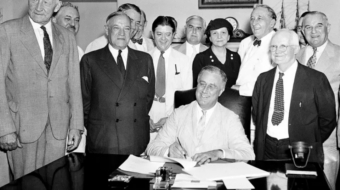
When my grandfather packed up his family to move cross-state in pursuit of employment, he could hardly have imagined what the future would hold for them. It was the early 1970s, and good-paying jobs were scarce in southeastern Ohio. With hopeful prospects, the O’Neils left the foothills of Appalachia, hills they had inhabited for generations, and moved to the Detroit area. Grandpa knew the value of a good name, honest labor, and solidarity – something he learned from his parents who possessed little else besides these. In this new environment, Grandpa was able to provide a better lifestyle for his family than he received from his coal-mining father, and everyone who knew him associated our family name with hard work and integrity.
I am writing this from the café of my private college, miles away from Detroit, where I have been reflecting on my academic career and preparing mentally for an approaching graduation. I will soon enter the job market and begin a decades-long adventure as one of the educated working class. The opportunities ahead of me are far grander than any my grandfather could have imagined for himself, but they would be impossible without the foundation he began laying for me over 40 years ago, a foundation rested squarely on working class values.
“You’re an O’Neil – that should mean something to people,” my grandpa told me once, when as a little boy I was caught in a fib. He went on: “When they think about you, they should think about the good you stand for.”
There were always economic ups and downs for our family, but the one thing that remained constant was his integrity. People knew that he would stand up for what was right; he let them see that a good name has no connection to a bank account. In fact, he was always reasonably suspicious of those who attempted to let their money build their reputation. Rich or poor, doing what is right is what matters most and it should be the hallmark of any human being, regardless of class.
To my grandfather, what is right, what matters most, is that which is equitable to all and builds solidarity among the working class. Grandpa knew his share of strikes, and many of them hit at very inconvenient times for himself and the family. Even when the strike came at a low point economically, my grandpa stood with his fellow workers and demanded that their voice be heard. Sometimes their demands were met. Sometimes they were not. But success did not necessarily depend on whether or not the bosses caved and threw the workers a bone once in a while. He measured it by how unified the voice of the workers became, how willing they were to form bonds of solidarity that could not be broken by the attempts of union-busters.
To be working class, especially in the time of my grandparents and their parents, was to possess nothing but what was inscribed in your character. They carried their most precious possessions around with them everywhere they went – and they shared them generously through genuine smiles and helping hands. By such strong solidarity, they lived the motto “An injury to one is an injury to all.” My working class ancestors didn’t need education, banks, or institutions running the show; they had each other and they had themselves, the only place they could assuredly place their trust.
I am not descended from bankers, Wall Street moguls, or CEOs of Fortune 500 companies. Surrounded by their grandchildren, I sit here in my college café and whisper words of gratitude for my distinct heritage. It is impossible for me to be ashamed of descending from Appalachian coal miners. Far from it! I am proud of the work they did. I glow at the thought of being bred from those whose toil built the heartland of America. These men and women understood what life was about, they understood what it meant to stand for something – something that is more powerful than all the gold of the capitalists.
Photo: Amy CC 2.0










